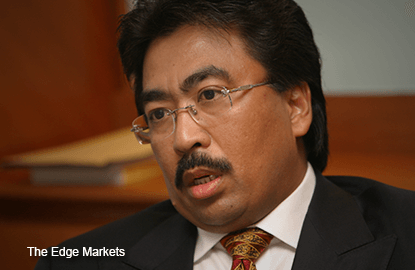
KUALA LUMPUR (Oct 19): The Employees Provident Fund (Amendment) Bill 2015 has affirmed that the age for withdrawal by members of the Employees Provident Fund stays at 55 years, while new contributions made after 55 years old can only be withdrawn when the member attains the age of 60.
Deputy Finance Minister Datuk Johari Abdul Ghani tabled the EPF (Amendment) bill for first reading in Parliament today.
He said the second reading of the bill will be tabled in this Parliament session.
A proposal has been made earlier to lift the EPF withdrawal age from 55 to 60, but faced tremendous objection from the public. In April, Prime Minister Datuk Seri Najib Razak, who is also the finance minister, had announced that the EPF withrawal age would stay at 55.
The amendment is a new Section 55B included in the bill, which provides that the age of withdrawal of a member's contribution deposited after the age 55, may only be withdraw when the member attains the age of 60 years old, or such other age may be prescribe by the Minister of Finance by order published in the gazette, whichever is higher.
In other words, the minister can prescribe a gazette, which stated a higher age of withdrawal than 60 years old.
After the member reached 60 years old, the EPF Board may authorise the withdrawal of a member or parts of the amount standing to his credie to any terms and conditions, as may be prescribed by the Board.
Further, the bill also amends Section 26 of the EPF Act, to expand the scope of investment of the fund, which enables the board to invest moneys belonging to the Fund by depositing the moneys in a bank or an investment bank or Islamic Bank, or a development financial institution.
It also enables the board to invest moneys belonging to the Fund in shares offered pursuant to an initial public offering (IPO) or shared listed on a sotck exchange.
The bill also insertd a new Section 69A, which provides for the Public Authorities Protection Act 1948 to apply to any action, suit, prosecution or proceedings against the board, a member of the board, a member of the investment panel, a member of the committee established by the board, and any officer and servant of the Board, in respect of any act, neglect or default committed by it or him, or any omission by it or him, in good faith in such capacity.
Also, the bill amended 45 (3), which requires the employer who fails to pay any contribution due within a period prescribed by the Minister, in addition to such contribution, to be liable to pay dividend on such contribution at the rate determined by the Board.
In addition, the bill has introduced new sections to provide for the establishment of the Syariah Advisory Committee (SAC), which shall be the authority for the ascertainment of Shariah matters, to provide advice to the board and the investment panel.
The SAC will ensure the management of accounts of members of the Fund, whose elections for their accounts is to be managed according to Shariah principles.
The election, provided under Section 43A, shall take effect from the date as determined by the Board; however before the effective date, a member may revoke the election. After the election is effective, the Board shall segregate the account of such member, from other accounts.
The SAC members, to be appointed by the EPF Board, shall not be less than three. They must be from among persons who are qualified in syariah or have knowledge in syariah and in banking, finance, law, as well as other related disciplines.
The members shall not be entitled to any renumeration, but must be paid honorarium and travelling and subsistance allowances.
The bill also provides that the board and investment panel shall refer to SAC on any matter relating to syariah, relating to the accounts of the members, and the advice given by the SAC shall be binding on the board and the investment panel.